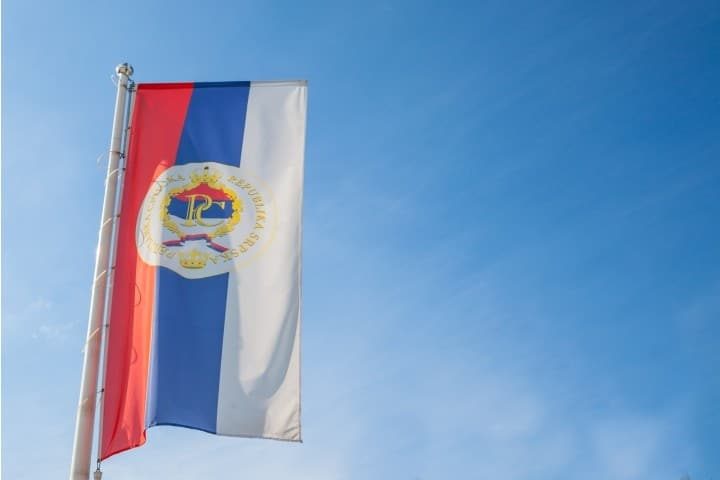
The international establishment has come out in opposition to new moves by lawmakers in Bosnia and Herzegovina’s (BiH) Serbian autonomous region to move toward independence through a breakaway from key national institutions.
Bosnia and Herzegovina is demographically composed of three main ethnic groups: Bosniaks, Croats, and Serbs. The country has a relatively weak fellow government and is divided into two regions: The Federation of Bosnia and Herzegovina (70 percent Bosniak, compared to 22 percent Croat and 2.5 percent Serb) and the Republika Srpska (“Republic of Serbia”), which has an overwhelming 81-percent Serb majority to 14 percent Bosniaks and 2.4 percent Croats.
On Friday, the legislature of Republika Srpska (RS) voted to begin work on withdrawing the region away from BiH’s tax system, judiciary, and army.
The action drew sharp rebukes from the United States, the European Union, the U.K., Germany, France, Italy, and Turkey — who accused Bosnian Serbs of threatening the stability of the Balkan region and putting the country on a path to war.
The Bosnian War consumed the region from 1992 to 1995 after the breakup of the preceding state of Yugoslavia. It was fought between Serbs on one side and Bosniaks and Croats on the other (although tensions between Croats and Bosniaks erupted into a war within a war between the two initial allies).
The war claimed the lives of approximately 100,000 people and was settled by the Dayton Agreement, which created a single sovereign state of Bosnia-Herzegovina made up of two parts.
Milorad Dodik, leader of the Serbian nationalist political party Alliance of Independent Social Democrats (SNSD) and the Serb member of the country’s three-person presidency, supported the vote but maintained that its proponents are committed to strictly peaceful means.
“The Republic of Serbia will not take military measures and if it comes under military attack, it will fight to resolve it by political means,” Dodik said.
“We will only continue our path through political means. Just because we lack military might does not imply that we have lost. I reject war. I call on this assembly to reject the war.”
Dodik invokes the right of Bosnian Serbs to self-determination. In 2008, he stated that Muslim judges should not be allowed to preside over cases in Republika Srpska. In November of this year, speaking in support of further Serb withdrawal from the national armed forces, Dodik said, “We will not allow the Armed Forces to become a Muslim army.” Most Bosniaks are Muslim, while Serbs are predominantly Orthodox Christians and Croats are mostly Catholic.
Western countries released a joint statement that read, “Members of the governing coalition in the RS must be aware that continuing this dead end path … is damaging the economic prospects of the entity, threatening the stability of the country and the entire region and jeopardising BiH’s future with the EU.”
They accused Serbs of challenging the Dayton Agreement and called on Serb political leaders to “[abandon] divisive and escalatory rhetoric and return to the state institutions in full capacity.”
U.S. Secretary of State Antony Blinken issued a letter vowing sanctions against anyone who threatens the post-Dayton peace. As a senator, Joe Biden supported American military assistance to Bosnia’s Muslim-led government, while Blinken was on the National Security Council staff when the United States intervened militarily.
Anadolu Agency noted the origin of the present disagreement:
The dispute erupted after Valentin Inzko, former high representative for Bosnia-Herzegovina, amended the criminal code in July to ban the denial of genocide and the glorification of war criminals.
In response, Bosnian Serb lawmakers said that they would boycott the country’s institutions.
Dodik denounced the amendments. “We will not live in a country where someone can impose a law by simply publishing it on his website.”
… He also contributed to pass a bill in October through the Republika Srpska assembly that transferred the powers of the nationally authorized Bosnia-Herzegovina Pharmaceuticals and Medical Equipment Agency to a new institution established within Republika Srpska, which was criticized for potentially undermining the country’s Constitution.
The High Representative for Bosnia-Herzegovina, who wields immense powers such as the ability to dismiss elected officials, is selected by the Peace Implementation Council (PIC), an international body created by the Dayton Agreement.
Turkey’s Foreign Ministry also criticized RS lawmakers.
“We consider that the decisions taken in the entity assembly are harmful to the constitutional and legal framework and therefore detrimental to the peaceful and prosperous future that the citizens of Bosnia-Herzegovina deserve very much. It is also a challenge to the peace and stability of the Balkans and the whole of Europe,” the ministry said.
One of the few allies of the Bosnian Serbs is Russia, which did not sign the PIC’s statement of condemnation. Dodik met with Russian President Vladimir Putin in Moscow earlier this month.




